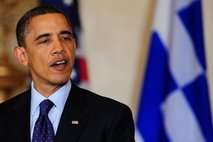|
|
Libya speech: What Obama will try to say
By Marc Ambinder
- March 29, 2011
 As President Obama attempts to draw a circle around the military engagement in Libya on Monday night, he is simultaneously drafting an annex to the doctrine of American power that circumscribes his own actions. Obama is going to try to tell us when he thinks that America's awesome arsenal should be put to use against bad people, and then the circumstances that don't call for the exercise of war-making.
When a president orders troops into battle, his justification is usually a consequence of policy (when such intervention is warranted), capacity (do we have the resources to do it?) and exigency (what precipitated the action?).
Libya seems easy: the universal dignity of all humans is something America respects and has the ability to protect, and the slaughter of civilians was imminent. But some clarification is warranted. As he writes his draft, there are a number of despotic regimes that place little value on the dignity of their own citizens, and hard evidence that several, including two in the Middle East—Yemen and Syria—have staked their survival on violently squashing unrest. Obama ordered no troops into the Sudan, preferring soft power there, even as people were dying. The U.S. has no intention of forcefully interposing itself between the government forces in the Ivory Coast and the hundreds of civilians who've been massacred there after a recent election. When a country that hosts the U.S. 5th fleet, Bahrain, mistreats its citizens, do the obligations change? Should they? More conspicuously, the United States remains at war in Afghanistan, a country that is less of a safe haven for al-Qaida than Yemen, a country whose instability is probably more acutely dangerous to U.S. national interests than any other except for Pakistan.
A large number of Americans support the policy of a no-fly zone in Libya, even in its enhanced form, which is what the U.N. Security Council resolution allows: short of putting American boots on the ground, if Muammar el-Qaddafi's troops move an inch, they can be destroyed. But a bare majority support Obama's execution of the policy. This is an artifact of political polarization, of course—the number of Republican presidential candidates who have altered their positions on Libya as Obama's have become clear is approaching several. But it's also a function of confusion.
Why does American policy (which is regime change) differ from the U.N. Security Council resolution (which does not call for it), and why does Obama feel constrained by the U.N?
Why isn't the U.S. in the lead here?
What are the ramifications of invading (in a way) a Muslim country, again?
What's the end game?
How long will U.S. troops be engaged in this area of operations?
If Obama can clear this up, then his speech will be a success. It will alleviate some pressure from Congress and from elite commentators who remember everything the president says and does about military intervention abroad and are determined to point out the evident inconsistencies.
If there is a thread that connects, at least in the president's mind, his foreign policy engagements, he needs to make it thicker. Foreign policy decision making is a lot more ad hoc than pre-planned, but it can't seem that way, especially when the lives of U.S. soldiers are at stake, and when Congress, including members of the president's own party, are making noise about constitutional prerogatives and war powers.
To Obama a stable Middle East is a major national interest worth fighting for. An unstable Libya makes the democratic current that is running through the region (and its neighbors, Egypt and Tunisia) less viscous. It has second-order ramifications in Iran. It risks becoming a safe haven for terrorists.
"Let me be clear." The line is a mainstay of almost every major presidential address on foreign policy. Whether Obama succeeds in conveying his complex intentions with a pithy phrase or two is often less about the skill of his speechwriters and more about America's capacity for accepting decisive military action by their commander in chief. But it's also about who the man is—and whether, as his own re-election approaches, Americans know enough about Obama's vision to let him see it through.
|
|
|
|
|
|  |
|
 As President Obama attempts to draw a circle around the military engagement in Libya on Monday night, he is simultaneously drafting an annex to the doctrine of American power that circumscribes his own actions. Obama is going to try to tell us when he thinks that America's awesome arsenal should be put to use against bad people, and then the circumstances that don't call for the exercise of war-making.
As President Obama attempts to draw a circle around the military engagement in Libya on Monday night, he is simultaneously drafting an annex to the doctrine of American power that circumscribes his own actions. Obama is going to try to tell us when he thinks that America's awesome arsenal should be put to use against bad people, and then the circumstances that don't call for the exercise of war-making.
 We recommend
We recommend



